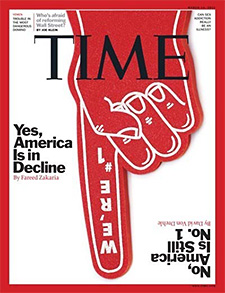Ichabod
The Glory is Departing
By Tim Moore

The writer of Ecclesiastes tells us that “there is nothing new under the sun.” Some interpret that to mean the more things change the more they stay the same. Others simply assert that although technology and what passes for knowledge has changed, the heart of man has not changed. The Bible proves time and again the truth of the great hymn: “Prone to wander, Lord I feel it; prone to leave the God I love.”
Sadly, that truth does not just relate to individuals, it relates to peoples and nations as well. Kingdoms, city-states, and nations rise and fall. There is yet to be a nation under heaven that has not wandered away from the very God who has poured out blessing upon it. Some have been characterized by faithfulness to biblical Christianity — at least in cultural mores. But, the societies that once reverberated with Christian truth throughout the Western world have succumbed to a post-Christian ambivalence toward truth itself.
How did the West stray so far, and is there hope for America, teetering on the brink of that same fate?

Biblical Examples
We can learn much from the example of Israel and Judah. Made up of God’s own Chosen People, those nations were destined for greatness. Their people were blessed as no other nation, raised up literally to bear testimony to what a relationship with the living God could mean. Long before America sang of God’s grace being shed on our land, His unmerited favor fell on the Jewish people. He did not choose them because they were more worthy. Moses made it clear that He did not even choose them because they were mighty in number, but rather because of God’s love and grace (Deuteronomy 7:6-8).
Did the Jewish people appreciate the singular privilege of such a blessing? Did they revere the God who poured out such blessings? Clearly not. That is why the Lord repeatedly sent prophets to warn, to call to repentance and to declare judgment.
Consider the situation in Israel immediately following the period of the Judges. The book of that name tells us repeatedly that “in those days there was no king in Israel; everyone did what was right in his own eyes” (Judges 21:25). There were a few individuals who lived upright and exemplary lives. Ruth tells of one such man named Boaz, who foreshadowed his descendant who would become the ultimate kinsman-redeemer. But, First Samuel describes a people who were generally going through motions rather than seeking hard after the Lord. Even the priests and religious leaders had grown apathetic toward God.
Spiritual Corruption
The text tells about the worthless sons of Eli — Hophni and Phinehas. Although serving as priests of the Lord, they did not know Him. Their disdain for God and self-serving interaction with the people was well-known. Eli recognized their evil ways — from helping themselves to the sacrifices dedicated to the Lord to sexually cavorting with women at the very doorway of the tent of meeting. And yet, he did not take action to hold his own sons accountable and ensure reverence before God.
In 1 Samuel 4, the people found themselves drawn up in battle against their ongoing foe, the Philistines. After straying from God under the errant spiritual leadership of men like Hophni and Phinehas, Israel found itself defeated. The Israelites expressed complete surprise, exclaiming, “Why has the LORD defeated us today before the Philistines?” (v. 3). Their solution was to trot out the Ark of the Covenant, presuming upon the Lord’s protection. In other words, although their hearts were clearly far from Him, the Israelites looked to their god-in-a-box as the ultimate weapon or the surest talisman.
Viewing God as a Good-Luck Charm
How many people today wear a cross necklace or WWJD bracelet or some other such bobble, not to shamelessly proclaim, “Jesus is Lord,” but because they think God is obligated to shield them from all harm if they just cover themselves in Christian symbols? Sort of like the old horror movies where the vampire could be driven back by a mirror or a cross. But God is not a cosmic good-luck charm to wear when the going gets rough.
Samuel records the results of such callous treatment of God and disrespect of His Shekinah Glory hovering above the Ark’s Mercy Seat. To their dismay, Israel was soundly defeated once again and the Ark was captured. On top of that, Hophni and Phinehas — the two men whose position as priests should have given them insight to know better — were killed. When a young man brought news of the tragedy back to Eli, the chief priest of Israel fell over, broke his neck, and died.
The Bible is unflinching in its description of Eli. It says that Eli was very old and could no longer see, and that he was very heavy. It also says that Eli had judged Israel for 40 years. Taken together, it is instructive to consider why those traits are specifically included.

The Symbolism of Eli
At 98 years old, Eli had clearly lived a long time. He had seen much, stretching back into the period of the Judges. During his lifetime, the Jewish people had established themselves in the land and had been served by a series of judges — men and women who offered unifying leadership.
Eli had seen Israel beset by trials from the very people they were supposed to eliminate from the land. He had witnessed the tribes fracture and drift from their pledge to serve only the God of Abraham, Isaac and Jacob. And, he had served as high priest to the Lord at Shiloh — where the Ark resided in the tent of meeting. It is not unreasonable to think that at 98 years old, Eli should have been at the pinnacle of his priestly wisdom and influence. And yet…
He did not effectively intervene to deal with the evil behavior of his sons. He did not counsel the Israelites to seek the Lord instead of just trotting the Ark out like some holy talisman or charm. In short, other than his wise counsel that young Samuel should respond to the voice he kept hearing by saying, “Speak LORD, for Your servant is listening,” Eli seems to have been ineffectual in his role as judge and high priest. In short, he lacked the wisdom of his own age.
Scripture also says that Eli could no longer see. That is meant as a description of physical limitation, but it seems an obvious commentary on his spiritual state as well. Although he was aware of his sons’ wicked behavior, he closed his eyes to it and allowed them to continue their evil ways.
Moses had warned that disobedience to God would lead the Jewish people into spiritual blindness. He wrote, “The LORD will smite you with madness and with blindness and with bewilderment of heart; and you will grope at noon, as the blind man gropes in darkness, and you will not prosper in your ways; but you shall only be oppressed and robbed continually, with none to save you” (Deuteronomy 28:28-29). Even in his old age, Eli had to recognize that Israel had lost its way and become blind under his leadership.
Eli’s Obesity
Interestingly, Eli is one of the few characters in the Bible whose girth or weight is deemed worthy of comment. The first was arguably Eglon, king of Moab. Because the sons of Israel did evil in the sight of the Lord, God strengthened Eglon to execute judgement. Judges 3 explains that Israel served Eglon for 18 years, until Ehud the Benjaminite struck down Eglon and led Israel to victory and 80 years of peace. The Bible says that Eglon had grown so obese that when Ehud thrust a sword into the Moabite king, his belly fat closed over the blade.
Why is the record of Eli’s weight mentioned? Because Eli’s weight is also relevant to the story. Upon hearing of the loss of the Ark, Eli fell over backward and broke his neck — “because he was old and heavy.” How does a priest get heavy? It is implied that Eli had followed the self-serving practice of his sons who not only plunged their three-pronged forks into the sacrificial meat, but also demanded uncooked fatty meat. First Samuel 2:17 describes such behavior as despising the offering of the LORD.
None other than celebrity chef Gordon Ramsey has put a culinary twist on the subject, declaring:
I always say, “Never trust a fat chef,” because they’ve eaten all the good bits! Trust a skinny chef because you know they haven’t indulged and eaten everything.
Am I condemning those who tend toward the hefty side today? Not at all. I’m stepping on my own toes even making this observation because I’m already tending to exceed the Air Force weight standards I maintained so carefully for 34 years.
But, in the era in which Eli lived, Israel’s economy was driven by agriculture. Most people would have been lean due to a limited diet and tireless work. The picture of a priest who can only be described as heavy is worthy of remark because it offers a contrast. The clear insinuation is that Eli had indeed indulged and eaten himself into obesity — taking advantage of the priestly office he held.
There can be no escaping the fact that America is one of the most overweight societies in the world. It is as if we have become so accustomed to the bounty of food that we no longer moderate our own intake. As such, the scourge of high blood pressure and heart disease and other weight-related ailments is at an all-time high — and growing every year. And, certainly, that physical description of our society goes hand-in-hand with its increasingly anemic spiritual health.
A Time of Testing
The last comment on Eli’s life was that he judged Israel for 40 years. What an interesting length of time. 40 years or 40 days appears over and over in Scripture. The Bible mentions that specific number 146 times. Moses lived 40 years in Egypt and 40 years in the desert before God called him to service. He spent 40 days on Mount Sinai on two separate occasions and gave the Hebrew spies 40 days to observe the Promised Land. The Jews then wandered in the wilderness for 40 years. Nineveh was given 40 days to repent before destruction fell. And, Jesus was tempted by Satan over a 40-day period.
It has been observed that the number 40 seems to symbolize a time of testing or probation or trial. Obviously, Eli was not the only judge to serve for 40 years (Othniel, Deborah and Barak, and Gideon each judged that long). Saul and David and Solomon also reigned for 40 years each. But, Eli’s tenure is marked by a steady decrease in faithfulness and respect for God — as manifested by his own sons. The people of Israel clearly failed that period of probation when they treated the Ark of the Covenant so disdainfully.

American Parallels
What application can be made to our society from Eli’s tragic end? Eli was old enough to have seen great blessing, and to have known better than to have strayed from truth. The former Speaker of the House of Representatives, Paul Ryan, often declared the United States to be the oldest democracy in the world. Although we could quibble that ours is a republic, the fact remains that our nation is old enough to know how to act better than we do. Instead of statesmen and leaders, we are served by men and women who give lip service to truth but seldom act upon it.
Why did Eli’s sons — and Eli himself — stray so badly? It seems that Eli tolerated too much. That was the offense Jesus cited against the church of Thyatira in Revelation 2. How much of America’s decline has occurred because Christians have silently tolerated too much?
Regarding sight, Puritan (and later Massachusetts Governor) John Winthrop proposed a society that “shall be as a city upon a hill, the eyes of all people upon us.” And yet, our nation seems to embody the church at Laodicea, to whom Jesus said: “You say, ‘I am rich, and have become wealthy, and have need of nothing,’ and yet you do not know that you are wretched and miserable and poor and blind and naked” (Revelation 3:17).
Our nation also seems to embody the people Jesus spoke of in Mark 8:18 when He quoted from Jeremiah 5:21: “Now hear this, O foolish and senseless people, who have eyes but do not see; who have ears but do not hear.”
And, how much could be written about America’s heavy girth? We are one of the most obese nations in the world. How much of our collective and individual bulk reflects a tendency to overindulge — selfishly consuming to an unhealthy extreme? Are we physically or spiritually fit to run a race? Paul admonished the Corinthians (and us, by extension) to run in such a way that they could win (1 Corinthians 9:24-27). Many of us would be hard-pressed to amble for an extended period, let alone sustain the physical and spiritual pace Paul maintained throughout his life as a Christian.
Regarding the 40-year period of Eli’s service as judge, I would observe that America has definitely entered an era of steady decline. Our economy is booming, unemployment is at record lows, but most people sense that something is terribly amiss. If the current era represents our time of national testing, or probation, or trial, we are certainly failing. It is obvious that we are demonstrating a steady decrease in respect for God and faithfulness to His Word.

An Unnamed Voice
There is one other significant player in 1 Samuel 4, although she is never named. Eli’s unnamed daughter-in-law understood the gravity of losing the Ark. Upon giving birth to Phinehas’ son, she declared that the boy be named Ichabod, saying, “The glory [of the Lord] has departed Israel” (1 Samuel 4:21). Her sadness and despair are palpable.
I am convinced that the glory of God is leaving America. What was once a shining city on a hill has become a twisted caricature of unholy self-righteousness. Like the ancient Israelites, we think we are immune from harm because we like to think of ourselves as a Christian nation. Would Jesus not say to us as He did the Israel of 2000 years ago, “You hypocrites, rightly did Isaiah prophesy of you: ‘This people honors Me with their lips, but their heart is far away from Me'” (Matthew 15:7-8).

God’s Incredible Patience
Of course, that was not the end of the story for ancient Israel. In God’s good time and because of His graciousness — meaning His willingness to extend unmerited favor, God restored the blessing on Israel and then Judah. Still, time and time again they strayed — until His patience was at an end. He sent prophet after prophet to call the Jews to repent. Jeremiah said it this way (Jeremiah 2:1-13):
1) Now the word of the LORD came to me, saying,
2) “Go and proclaim in the ears of Jerusalem, saying, ‘Thus says, the LORD, “I remember concerning you the devotion of your youth, the love of your betrothals, your following after Me…
4) Hear the word of the LORD, O house of Jacob, and all the families of the house of Israel.
5) Thus says the LORD, “What injustice did your fathers find in Me that they went far from Me and walked after emptiness and became empty?
6) They did not say, ‘Where is the LORD?’
11) Has a nation changed gods when they were not gods? But My people have changed their glory for that which does not profit.
12) Be appalled, O heavens, at this, and shudder, be very desolate,” declares the LORD.
13) For My people have committed two evils; they have forsaken Me, the fountain of living waters, to hew for themselves cisterns, broken cisterns that can hold no water.
A sad summary of Judah’s attitude is captured in 2 Chronicles 36:
15) And the LORD, the God of their fathers, sent word to them again and again by His messengers, because He had compassion on His people and on His dwelling place;
16) but they continually mocked the messengers of God, despised His words, and scoffed at His prophets, until the wrath of the Lord rose against His people, until there was no remedy.
Our Nation’s Future
David Reagan has long declared that judgment is overdue for America. Many agree. Ruth Bell Graham, convinced that our society was deserving of the wrath of God, said, “If God doesn’t punish America, He’ll have to apologize to Sodom and Gomorrah.”
The question remains whether there is any hope for America. Every indicator screams that we are accelerating our headlong rush away from the living God and into a hellish abyss. Abandoning the God of our fathers, our nation seems determined to embrace the sexual revolution and cast our lot with post-Christian secular Humanism.
If that be the case, our nation will soon join the long line of societies that have been relegated to the dust bin of history. Once vibrant and alive, we are in the process of withering up and becoming just another collection of dry bones in a long, twilit valley.
So, can these bones live?
To cite another prophet’s very wise response when the Lord asked him that exact question, “O Lord God, You know” (Ezekiel 37:3). Indeed He does.
Without a miracle of God, America’s dry bones will not experience another great awakening. The division and rancor within our society are driving us further apart, not together. We are a living fulfillment of Romans 1, and God is undoubtedly giving us over to our own depraved minds (Romans 1:28).
But…
Until Jesus Christ calls us to Himself, we must have and share hope, even as we await our Blessed Hope. Many are being deceived. Eventually some will realize that they are wandering in darkness and seek the light. If modern Pontius Pilates ask of us, “what is truth?” we know the Person who is Truth.
Redemption may never come for our nation, but it will come for individuals who put their faith in Jesus Christ. In 1 Corinthians 6:9-11, Paul cites a partial list of the unrighteous acts that can be covered by the blood of Jesus. There is not now — and never will be — condemnation for any who are in Christ Jesus. Even as darkness descends and society turns away from Him, the God of Hope offers joy and peace to all who believe in Him by the power of the Holy Spirit (Romans 15:13).
Until He does come, follow Paul’s example. To paraphrase his charge (2 Timothy 4:7-8):
Fight the good fight, finish the course, keep the faith, for in the future there is laid up for you the crown of righteousness, which the Lord, the righteous judge, will award to you on that day; and not only to you, but also to all who have loved His appearing.
Although Eli’s daughter-in-law saddled her son with the tragic name, Ichabod, it conveyed a tragic truth: the glory of God had departed Israel. We must face a similarly tragic truth today: the glory of God is departing America. But, our hope is not built on the sinking sand of an apostate culture. We can encourage each other because we know that the manifest glory of God is coming again soon in the person of Jesus Christ.
My prayer until He does will remain: Godspeed!




